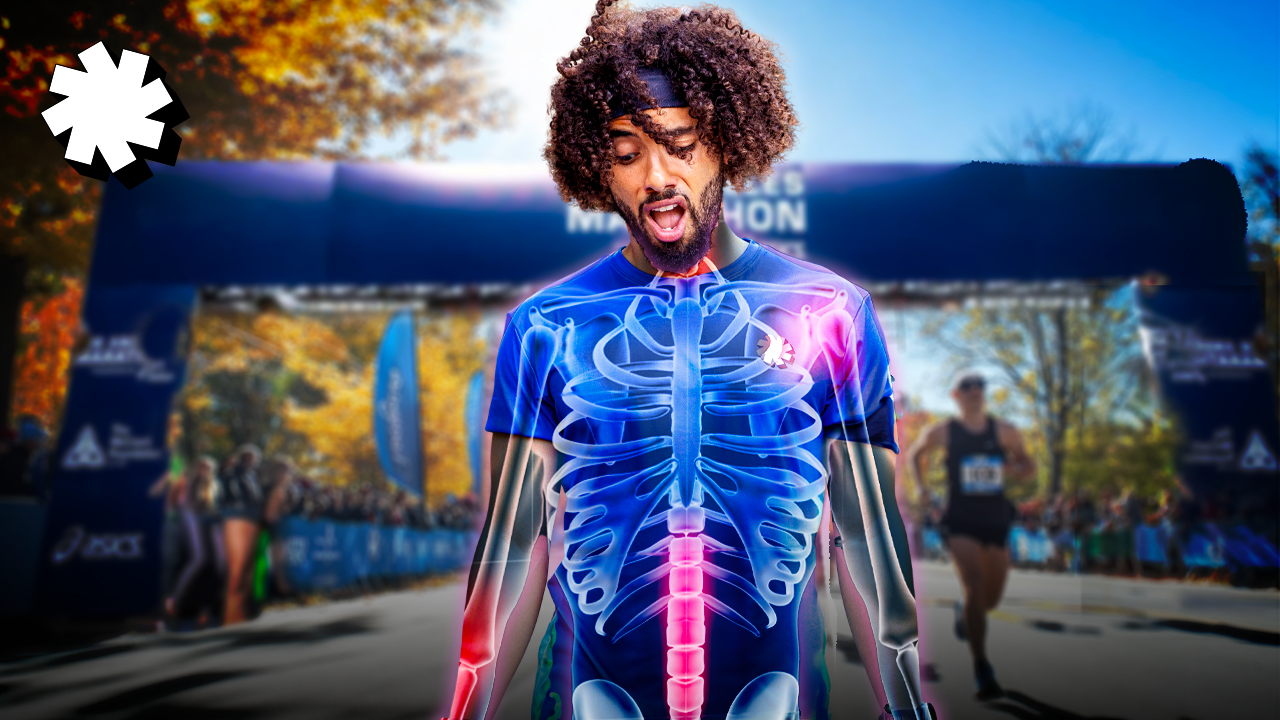Can You Run With A Cold?

What does having a cold mean for runners? We’ve looked at the science to see if we can go for a run if we have a cold or if we should be taking some days off?
We’ve also written about ‘runner’s flu’ and how some runners pick up a cold after a race.
WHAT IS A COLD?
A common cold is a virus which affects the upper respiratory tract (that’s your nose, mouth and throat). The main symptoms include a blocked or runny nose, sneezing, sore throat, headache, tiredness, body aches, and a cough. It’s typically a mild illness which comes and goes over a few days.
Typical treatments for the symptoms of a cold include rest, drinking plenty of fluids and eating a healthy diet. Some medicines can also help to ease the symptoms.
The NHS and CDC offer advice on how to deal with a cold and when to seek medical help. You should seek professional advice if you’re concerned about the severity of your symptoms – we’re discussing this topic as runners, not doctors, and are presenting the research to help you make an informed decision based on how you feel.
ADVICE ON RUNNING WHEN YOU HAVE A COLD
One of the most common bits of advice you hear about running when you have a cold distinguishes between symptoms that are above or below the neck, though before considering that it’s important to also know that any exercise you do while ill could lead to worsening symptoms or even more serious illnesses.
If you only have above the neck symptoms like a blocked nose, headache and sore throat, then you may be ok to continue exercising if you feel well enough, just be cautious and stick to low intensity and slow runs (so no interval sessions!), and a walk may be a better choice than a run in the first days of feeling ill. Monitor your symptoms if you run, and if you see that your heart rate is much higher than usual, or if you feel dizziness or nausea, then stop.
You should also avoid exercising in the gym if you don’t feel 100% as you could pass on your virus to others.
If you have symptoms below the neck, like a cough (especially a wet or chesty cough), heavy body aches, chills, nausea or diarrhoea, then do not exercise and wait until the symptoms improve before returning to running. Never exercise if you have a high temperature or fever.
If you have any underlying health conditions then always speak to a medical professional before exercising when ill.
CAN RUNNING HELP EASE THE SYMPTOMS OF A COLD?
This is one of the lines runners often use to trick themselves into thinking that going for a run is a good idea, but actually very easy running could help to clear a blocked nose, plus the feel-good chemicals our body releases after exercise could give us a nice boost if we’re feeling a bit rough.
But this should only be for above the neck symptoms, and your exercise should be very low intensity.
CAN RUNNING HELP TO PREVENT A COLD?
Moderate exercise is great for boosting your immune system as lots of studies tell us, as it lowers the incidence and intensity of viral illness by improving our blood flow and the movement of infection-fighting white blood cells, and reducing negative inflammation associated with immune function. Consistent, moderate exercise (around 45-60 minutes per day) can keep up this regular immune system boost.
But there is a lot of evidence that elite athletes suffer from more colds than non-elites, especially during periods of more intense training or following races, as after very hard or very long exercise sessions the immune system could be weakened for up to 24 hours.
So moderate exercise is great at keeping illness away, but hard exercise comes with an increased risk of getting sick.
HOW TO RETURN TO RUNNING AFTER A COLD
- Only return to running when you feel well enough and the worst of the symptoms have gone – and only consider running if you have symptoms above the neck. Anything below the neck or a fever is a sign that you need to rest
- Start by going for a walk instead of a run to see how you feel, and how much energy you have, then incorporate a walk-run approach if you want to ease back into running
- Stick to short, easy runs for a few days and go into them well-hydrated and well-fuelled (eating carbs can help to reduce some of the stresses of running on the body)
- Only begin harder sessions once all symptoms have cleared up and your energy levels have returned to normal, but still monitor things like your breathing and heart rate on your runs and adjust your intensity accordingly, or stop if you need to.




























Running News
Ingebrigtsen Stars at World Athletics Indoor Championships 2025 – Plus All The Winners!
Sam Ruthe Is First 15-Year-Old To Run A Four-Minute Mile!
Eliud Kipchoge Will Run The 2025 Sydney Marathon!